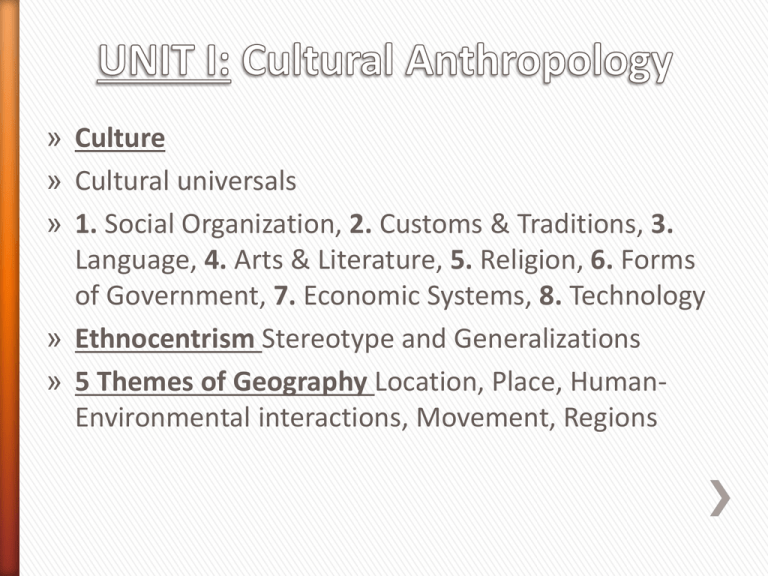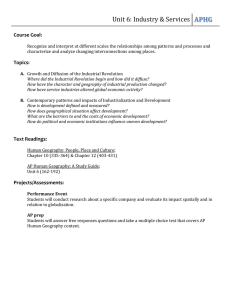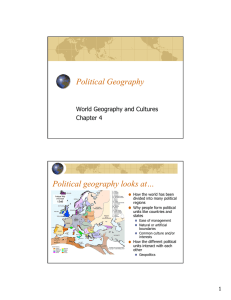What*s out there (in the world)?
advertisement

» Culture » Cultural universals » 1. Social Organization, 2. Customs & Traditions, 3. Language, 4. Arts & Literature, 5. Religion, 6. Forms of Government, 7. Economic Systems, 8. Technology » Ethnocentrism Stereotype and Generalizations » 5 Themes of Geography Location, Place, HumanEnvironmental interactions, Movement, Regions » Socio-economic Systems ˃ Communism ˃ Socialism ˃ Capitalism » Government/Political Systems Direct Democracy, Democracy, Republic, Totalitarian Governments (Oligarchy, Constitutional Monarchy, Absolute Monarchy, Fascism, Dictatorship, Theocracy) » Religion ˃ What is Religion? ˃ Why do people practice religion? ˃ Monotheism vs. Polytheism vs. Pantheism (Animism) ˃ Major Religions of the world » Maslow’s Hierarchy of Needs ˃ Why do people/countries do what they do, according to Maslow? » Culture ˃ How does my own ethnocentrism influence my interactions with other individuals and cultures? ˃ In a shrinking world (more globalized world) how do we interact with people who are different from us? ˃ What makes us who we are, both individually & as a society? ˃ How is culture shared? ˃ How do cultural differences affect interactions between cultures? » 5 Themes of Geography ˃ How does geography affect culture and cultural interactions? ˃ Is geography to blame for inequality/conflict in the world » Government & Economics ˃ What are the positive and negative effects of different government and economic systems? ˃ What makes an individual or community “buy into” a system? » Religion ˃ How and why do religions spread? 1. What is anthropology? ˃ Anthropos- Greek for Human ˃ -ology: Greek for __________. 2. What do Anthropologists study? 1. Location Where is it? » Absolute location: degrees of latitude and longitude. » Relative location: point of reference, e.g., near, far, a short drive. 2 . Place What is it like? » Physical Characteristics: ˃ landforms (mountains, plains, etc.) ˃ bodies of water (oceans, lakes, bay, etc.) ˃ ecosystems (soil, plants, animals, and climate) » Human Characteristics – ˃ ˃ ˃ ˃ ˃ Bridges, dams, canals roads buildings culture language » All places have features that distinguish them from other places. 3. Human/Environment Interaction » How do people interact with and change their environment? ˃ Dams, canals, fields, tunnels, pollution, » How does the environment affect human life? (Activities, culture, food, disasters) 4. Movement » How are people and places linked by communication and the flow of people, ideas and goods? ˃ ˃ ˃ ˃ Transportation Communication Trade Patterns of movement such as migration linkages and connections 5. Regions What are their unifying features and how do they form and change over time? » Regions are a basic unit for geographic study. » Geographers divide the world into regions to help them interpret events. » Regions can be defined on the basis of: physical and human characteristics. » For example: The Pacific Northwest, The Midwest, the Middle East, Eastern Europe, SubSaharan Africa » Step 4: Think as fast as you can. ˃ Come up with an explosion of ideas. Translate them into words, symbols, or pictures. » Step 5: There are no boundaries. ˃ Think outside the box. Anything goes. » Step 6: Don’t just too fast. ˃ Unrelated issues might be relevant later on. Think like you are brainstorming so you don’t get stuck on a word.






